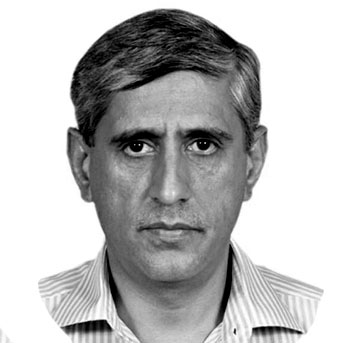Raashid Wali Janjua
DEUS Ex Machina is a Latin translation of a Greek phrase which literally means “god hanging from a machine”. In olden times during dramas on stage and theatres a god like figure was kept hanging above the stage held by a crane like machine and was brought down when a new turn to the drama had to be given. A Deus Ex Machina was always employed as a clever device to find a way out of a cul de sac like situation by the playwrights and directors. A god from heavens was supposed to descend to resolve a seemingly impossible dilemma. That was Greek art of drama at its best as the human mortals marvelled at the Deus Ex Machina’s power to deliver. We also have a political stage in our neck of woods over which a Deus Ex Machina hovers only to descend at regular intervals to resolve the intractable political as well as non-political dilemmas. Would our polity always need this Deus Ex Machina or democracy would find its roots like the rest of the advanced industrialized democracies? Or more importantly why is it that our polity needs services of a non-elected state institution to guide and steer it in right direction. The answer to this question would reveal the whole truth behind our governance and policy vacuums. As per Samuel Huntington military professionalism has three elements ie expertise, corporate interests and responsibility that define its role in national polity.
The expertise pertains to the core professional specialty whereas the corporate interests include pay and privileges including the welfare aspects. The responsibility pertains to the advisory role vis-a-vis the government in defence affairs. As per Paul Staniland the nature of threats, the strength of the national institutions, and the legitimacy of the democratic government determine the power balance between the civil and military components of the state. The realists or the determinists in the civil-military literature like Finer,(The Man on the Horseback) Huntington (Soldier and the State) and Harold Lasswell, (Garrison State) believe that if the militaries need to be controlled by the civilians the civilians need to strengthen democratic institutions and public legitimacy through good governance. Weak institutions and governance by civilian politicians invite the military intervention the world over. Public support and performance legitimacy ward off the praetorianism by the militaries. As opposed to determinists the constructivist school of civil-military relations thought believes that the military interventions in politics are a function of a country’s threat environment as well as the military’s self image as the custodians of territorial as well as ideological boundaries. The constructivists like Peter Feaver, Rebecca Schiff and Paul Staniland believe that the civilian and military components of the state need to be bound in a principal-agent bond wherein the military agents should always do the bidding of their constitutionally mandated civilian principals.
Constructivists echo the classic refrain of the British political scientist Samuel Finer who prognosticated in 60s that the military leaders on account of their organizational strength and patriotic fervour would always intervene if they find an opportunity and that the only antidote to the military intervention was a voluntary acceptance of civilian supremacy by the soldiers. He at the same time prophetically conceded that the civilian supremacy would be a pipe dream in countries with weak political institutions and bad governance resulting in public alienation. As per Staniland a country beset with dual threat environment ie external as well as internal threats would always have weak civilian control over the military. Now if we turn our analytical gaze towards Pakistan our political scientists like Hasan Askari, Ishtiaq Ahmed and Saeed Shafqat also point out the same problems that were highlighted by the foreign scholars. Pakistan’s political parties’ abysmal failure to develop into genuine political constructs with internal democracy has ceded the political space to the military which as per Samuel Finer is an invitation for intervention in governance and policy formulation. The lack of understanding of national security imperatives and lack of interest in their learning has been the besetting sin of our civilian establishment that has placed a heavy burden on the armed forces to shoulder the tasks beyond their strictly defined professional remit. The situation in historical context is reminiscent of the pre-1933 Weimar republic in Germany and pre-1945 Japan where the weak executive could not control a strong military.
The armed forces in Pakistan are operating in a high external and high internal threat environment for which they need the top of the line and optimally motivated human resource along with the modern hardware commensurate to the threat. The above explains the military’s ultra-sensitivity to troops’ morale and the fighting ability. How would the two be maintained at their best? The answer is obvious enough; through motivation and military hardware. The motivation relying on the Islamic concept of martyrdom also depends on the welfare measures for the soldiers and their families. It also depends on military hardware as nothing elevates the spirits of a warrior than first rate weapons and equipment. It would be obvious to even a layman that both cost money; hence military’s concern with military budget and welfare. When a patriotic military witnesses both of the above ends threatened by the venal politicians fighting for personal gains desire for steering the ship gains ascendancy. The military therefore in societies where the politicians run political parties as personal fiefdoms, lacking public legitimacy due to bad governance, has a role to play in national polity. The role as a Deus Ex Machina legitimized by public support however needs careful planning and execution and should therefore be based on proper strategy instead of merely reacting to events.
— The writer, a Retired Brig, is a PhD scholar at NUST, Islamabad.










